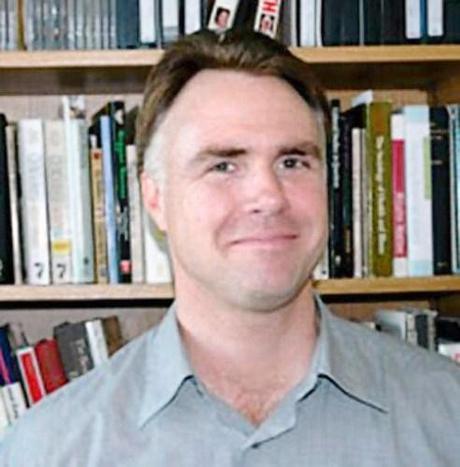Skepticism about the Establishment Media’s account of Connecticut’s Sandy Hook Elementary School massacre is snowballing. No longer is skepticism found on blogs, which the Establishment easily dismisses, a tenured professor at Florida Atlantic University (FAU) has now joined the ranks of inquiring minds.
He is James Tracy (photo below), 47, an associate professor of communications at FAU, who specializes in media history and analysis, political economy of communication, and conspiracy theories. Tracy received his Ph.D. in 2002 from the University of Iowa and before that, a Master’s degree in media studies from the University of Arizona.

Mike Clary reports for the South Florida Sun-Sentinel, Jan. 7, 2013, that Professor Tracy claims that last month’s Newtown, Conn., school shootings did not happen as reported — or may not have happened at all. In radio interviews and on his Memory Hole blog, he maintains that trained “crisis actors” may have been employed by the Obama administration in an effort to shape public opinion in favor of the event’s true purpose: gun control.
“As documents relating to the Sandy Hook shooting continue to be assessed and interpreted by independent researchers, there is a growing awareness that the media coverage of the massacre of 26 children and adults was intended primarily for public consumption to further larger political ends,” writes Tracy, a tenured associate professor of media history at FAU and a former union leader.
In another post, he says, “While it sounds like an outrageous claim, one is left to inquire whether the Sandy Hook shooting ever took place — at least in the way law enforcement authorities and the nation’s news media have described.”
On Monday, the website Global Research posted a timeline written by Tracy which purports to show how federal and local police agencies, abetted by “major media,” conspired early in the Sandy Hook investigation to construct a scenario pointing to Lanza as ” the sole agent of the massacre” when others may have been involved.
In one of his blog posts, “The Sandy Hook School Massacre: Unanswered Questions and Missing Information,” Tracy cites several sources for his skepticism, including lack of surveillance video or still images from the scene, the halting performance of the medical examiner at a news conference, timeline confusion, and how the accused shooter was able to fire so many shots in just minutes.
In an interview Monday, Tracy said “while it appears that people lost their lives” at Sandy Hook Elementary on Dec. 14, he is not ready to buy that a lone gunman, 20-year-old Adam Lanza, entered the school and methodically shot 20 children and six adults before killing himself.
Tracy said he believes the deaths at Sandy Hook may have resulted from a training exercise. “Was this to a certain degree constructed?” he said. “Was this a drill? Something most likely took place. One is left with the impression that a real tragedy took place.”
But, he added, he has not seen bodies, or photos of bodies. “Overall, I’m saying the public needs more information to assess what took place. We don’t have that. And when the media and the public don’t have that, various sorts of ideas can arise.“
Tracy also has doubts about the official version of the Kennedy assassination, the Oklahoma City bombing, the 9-11 terror attacks and the Aurora, Colo., theater murders.
“I describe myself as a scholar and public intellectual,” he said, “interested in going more deeply into controversial public events. Although some may see [my theories] as beyond the pale, I am doing what we should be doing as academics.”
Not surprisingly, FAU is distancing itself from Tracy’s views. The university’s media director Lisa Metcalf said, “James Tracy does not speak for the university. The website on which his post appeared is not affiliated with FAU in any way.”
In the Internet age, “We see more and more professors getting into trouble for what they’re posting on Facebook, or Tweeting,” said Gregory Scholtz, director of the department of academic freedom at the Association of University Professors. “And administrations are sensitive to bad publicity; they don’t like things that public might find obnoxious or reprehensible. But most reputable administrations stay above the fray and give latitude.”
Robert Shibley, an official with the Philadelphia-based Foundation for Individual Rights in Education, said Tracy is well within his rights of free speech, especially when teaching a course on conspiracy theory: “The only way that a university would have a right to tone it down, or insist he stop talking about it, is if students come to him and say they find it disturbing. People are allowed to talk about things that are upsetting — for example, abortion.”
Tracy said he knows he has sparked controversy on campus. In one of his courses, called “Culture of Conspiracy,” Tracy said some students have expressed skepticism about his views: “But I encourage that. I want to get students to look at events in a more critical way.”
*************
See also FOTM’s other posts on Sandy Hook:
- “Was Sandy Hook a “false flag” operation by the Obama regime?,” Dec. 30, 2012.
- “Spooky coincidences of Sandy Hook and Aurora massacres,” Dec. 21, 2012.
- “Sandy Hook dad goes from laughing to grieving in blink of an eye,” Dec. 30, 2012.
- “Professional crisis actors simulate mass casualty events,” Jan. 1, 2013.
- “Crisis Acting or True Grief? – You Decide,” Jan. 7, 2013.
- “Crisis Actor Photos,” Jan. 7, 2013.
- “Regarding Conspiracy Theories,” Jan. 6, 2013.
More on Sandy Hook school’s surveillance tape in my next post!
~Eowyn

